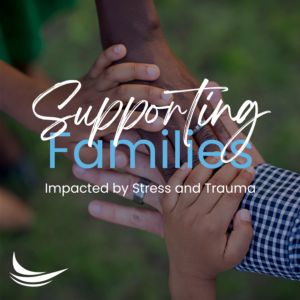 When children experience a traumatic event, the entire family is affected. Often, family members have different experiences and emotional responses to the traumatic event. A parent or caregiver may believe that their children are not directly impacted by highly stressful or traumatic events in the home such as divorce, moving or school changes, financial struggles, substance use, or relational conflict. Yet, many children develop symptoms shortly after the events, whereas some children may develop symptoms after a longer period.
When children experience a traumatic event, the entire family is affected. Often, family members have different experiences and emotional responses to the traumatic event. A parent or caregiver may believe that their children are not directly impacted by highly stressful or traumatic events in the home such as divorce, moving or school changes, financial struggles, substance use, or relational conflict. Yet, many children develop symptoms shortly after the events, whereas some children may develop symptoms after a longer period.
Validate your child’s experience by acknowledging their thoughts, feelings, and behavioral responses in response to traumatic events.
Recognize each other’s experience of the event and acknowledge that each person’s response is valid. This includes the child who is showing no/ limited signs with difficulties adjusting and the child who is showing more significant emotional and behavioral concerns when there are multiple children in the household. Each person has their own experience, and these are both valid.
Monitor for signs of stress that impact well-being.
Children may not recognize the signs of stress in their bodies and start acting out by having strong emotional outbursts, presenting as irritable, or withdrawing from others. Some children may be struggling with family or peer relationships. Academic struggles or school refusal can be present. Additional signs of stressed-out-kids include complaints of headache, stomachache, or difficulty sleeping.
Recognize that responses will vary according to your child’s developmental age and what they need may look different.
A very young child’s response is going to look different than a school-age child’s or teen’sreactions to traumatic events. Providing outlets for young children through play and drawing and being consistently reliable and available to comfort is important to help children cope. Young children may need help verbalizing their feelings. For older children and adolescents, encouragement to discuss worries, express feelings, and seek support in a setting such as a school is helpful as symptoms may interfere with academics and social relationships. Additional things that are helpful for adolescents include involvement in safety planning, gaining more information about traumatic events (e.g., impacts and consequences), processing their experiences, and having discussions on topics such as revenge when there are acts of violence.
Model self-calming and be available for your child.
It can be challenging to help children in the home when the adult(s) are also struggling. Children learn a lot from their caregivers, including how to express and regulate their emotions. Creating a calm and safe environment where one can listen to understand each other is a starting point. This is not going to happen when two or more people are escalated. When children are acting out, the first response may be to yell or raise voices, yet this only activates an already anxious nervous system and a child’s level of reactivity often matches that of the escalated adult. It can take much longer to calm-down your child. For parents of teens who struggle with impulse control or anger, this can be especially challenging.
If you are struggling in response to stressors or trauma impacting your family, CARE Counseling can support you and your family with coping.
It can take time to cope with feelings such as sadness, helplessness, anger, or guilt in not being able to protect children from a traumatic experience. When families are impacted by trauma, a trauma-focused approach can be helpful as well as interventions that focus on strengthening the parent-child relationship. CARE Counseling offers therapy that builds on resilience and coping including individual therapy, family therapy, and specialized approaches such as Trauma-Focused Cognitive Behavioral Therapy. https://care-clinics.com/
Build on family resiliency.
Shared experiences can help strengthen the bonds between family members and build resilience within this household. Although stressful and traumatic experiences can be difficult to navigate, they can also draw out strengths within the family unit.
Written By: Charlotte Johnson, MA, LPCC
We’re Here to help
Our wellness experts will be happy to take care of you. You can CLICK HERE to schedule an appointment now or call (612)223-8898.
Meet Clinicians
We’re united by our commitment to providing effective, relevant, and innovative mental health support at all stages of your journey. Click Here to find a therapist or find out more about who we are, where we come from, and how we live out CARE’s mission every day.
The professionals at CARE are actively collecting and creating resources to help with what you need and address frequently asked questions. We’re Here for You.



